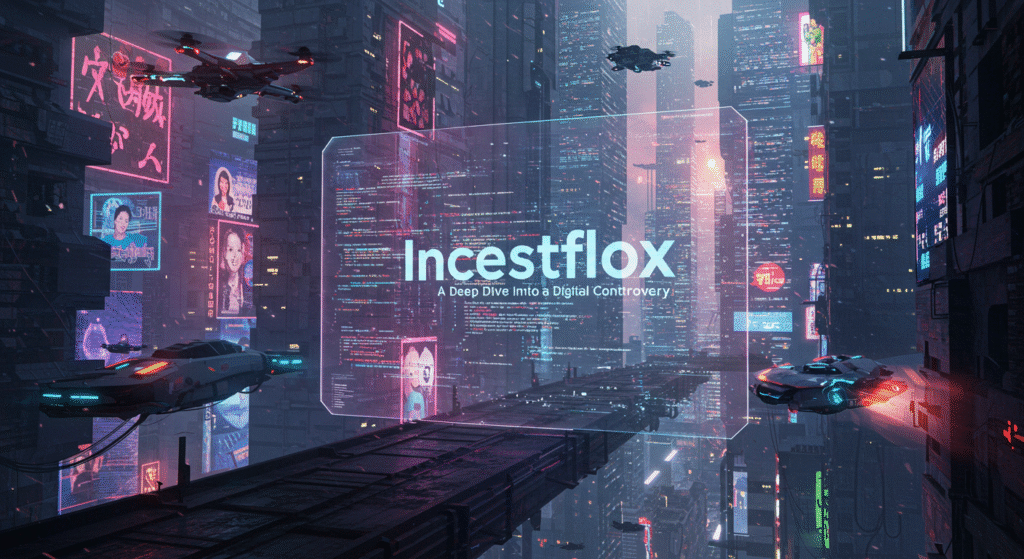The internet has birthed countless platforms, many of which cater to niche communities. Among these, Incestflox has emerged as one of the most controversial and ethically debated. Known across dark forums and obscure corners of the internet, Incestflox is a term that sparks discomfort, outrage, and curiosity. But what exactly is Incestflox? Is it a platform , media a subculture, a movement, or merely a myth perpetuated by sensationalist forums?
In this article, we will explore the phenomenon of Incestflox, its origins, sociocultural implications, ethical concerns, and its contentious position in the digital world.
What Is Incestflox?
Incestflox refers to an underground or fringe digital platform or network where users allegedly share, discuss, or fantasize about incest-related content. While concrete, verifiable information about the existence of such a platform is limited and often speculative, the term has circulated heavily in forums like Reddit, 4chan, and anonymous message boards. Whether or not Incestflox is a real, functioning platform, the term has come to symbolize a growing concern over digital ethics, censorship, and the line between fantasy and criminal behavior online.
Origins of Incestflox
The origins of Incestflox are murky. Some believe it originated as a fictional construct—similar to the way Creepypasta stories gained popularity. Others suggest that it evolved from fan fiction websites or taboo-themed adult platforms, eventually becoming its own subculture.
The “flox” suffix suggests a streaming or content distribution model—possibly parodying names like Netflix or HBO Max, thereby indicating that Incestflox may have started as a mock term that slowly took on a darker, more controversial connotation.
Incestflox and Digital Taboo Culture
Understanding Taboo in Online Communities
Incestflox sits at the extreme edge of what is often called digital taboo culture. This culture thrives on pushing boundaries, often as a form of rebellion against societal norms or censorship.
Taboos like incest, gore, or extreme fetishes have found underground followings online—not necessarily because of actual desire or practice, but because of the anonymity and shock-value-driven nature of these communities.
Incestflox’s Role in the Taboo Ecosystem
Incestflox may not be entirely unique—it likely mirrors platforms or forums that explore other forbidden themes. However, its name and implications hit a particularly sensitive nerve due to the universally condemned nature of incest.
Whether it’s through roleplay, fictional storytelling, or adult content, the existence of a place like Incestflox challenges how we perceive digital free speech versus social responsibility.
The Legal Implications of Platforms Like Incestflox
Is Incestflox Legal?
If Incestflox does exist as a platform distributing explicit or simulated incest content, it likely operates in legal gray areas or outright violates local and international laws.
Most countries ban the production and distribution of incest pornography, especially when it involves simulated minors or coercion. Even fictional content can cross legal boundaries, depending on jurisdiction.
Monitoring and Regulation
Law enforcement agencies around the world have ramped up efforts to monitor illegal online behavior. The inclusion of Incestflox in their radar would depend on factors such as:
-
Presence of real individuals engaging in criminal acts
-
Promotion of child exploitation
-
Cross-border content violations
If Incestflox remains fictional or restricted to simulated adult content, it might escape legal attention, but ethical concerns remain.
Ethical Debates Surrounding Incestflox
Is Fictional Incest Content Morally Wrong?
A major point of contention is the distinction between fantasy and reality. Some argue that fictional depictions—no matter how offensive—are a form of expression that should not be censored.
Opponents claim that even simulated or roleplayed incest content, such as that allegedly hosted or promoted by Incestflox, normalizes harmful behavior and contributes to the erosion of moral boundaries.
The Role of Platforms and Censorship
Should platforms like Incestflox be allowed to exist under the guise of freedom of speech? Or should they be shut down to uphold social morality?
Platforms like YouTube, Reddit, and Twitter have had to constantly battle with these questions. While most mainstream platforms have zero tolerance for incest-themed content, fringe communities argue for autonomy and minimal regulation.
The Psychology Behind Incestflox Consumption
The Forbidden Fantasy
Studies in psychology suggest that some individuals are drawn to forbidden content due to its taboo nature, not because they wish to engage in it. The allure lies in the risk, shock, and secrecy.
In the context of Incestflox, viewers may not be actual perpetrators or endorsers of incest. Rather, they are navigating the extreme edges of their psyche or indulging in symbolic rebellion.
Desensitization and Moral Decay
One of the strongest criticisms against Incestflox is its potential to desensitize viewers. Repeated exposure to taboo material may normalize extreme behavior or lower emotional sensitivity toward real-world abuse.
Experts caution that even fictional content can influence belief systems and behaviors, especially among younger or psychologically vulnerable users.
in Popular Culture and Media
Memes, Satire, and Online Jokes
Interestingly, I has been used satirically or comically in certain online circles. Memes mock the idea of a “Netflix for incest,” pointing out the absurdity while secretly highlighting just how thin the line has become between shock humor and harmful ideologies.
Mention in Fiction and Urban Legends
Some authors and online storytellers have used Incestflox as part of internet horror fiction, treating it like a cursed or forbidden website. This approach likens it to the early 2000s phenomena like Marble Hornets or The SCP Foundation, blending horror with social critique.
Is Incestflox a Hoax, a Warning, or a Reality?
While no official platform named Incestflox has been legally registered or formally acknowledged by tech watchdogs, its name continues to circulate. Whether real or not, Incestflox functions as a digital urban legend, a cautionary tale about the perils of anonymity, extremism, and unchecked content dissemination.
It serves as both a symbol and a symptom—a symbol of growing online desensitization and a symptom of a society wrestling with the implications of radical freedom of expression.
The Future of Platforms Like Incestflox
Stricter Regulation vs. Free Speech Advocacy
Going forward, platforms (real or hypothetical) will be at the heart of debates over:
-
Internet censorship
-
Platform accountability
-
Mental health impact
-
Freedom of sexual expression
Lawmakers and ethicists will need to balance the rights of individuals with the need to protect society from digital platforms that may facilitate harm.
The Rise of AI and Deepfakes
One potential danger is the role of AI in generating incest-themed deepfakes, which could be distributed on platforms . As synthetic media grows more realistic, so does the potential for abuse and exploitation.
Governments and tech companies must work together to create safeguards that don’t stifle creativity but prevent digital harm.
Conclusion: The Dark Mirror
Whether fact or fiction, represents the darker side of internet freedom. It challenges us to confront difficult questions:
-
Where do we draw the line between fantasy and crime?
-
What is the role of society in regulating deviant content?
-
Can we protect vulnerable minds without overreaching censorship?
Incestflox might be just a name, a myth, or a satire—but it is undeniably a mirror reflecting deeper tensions in our digital lives. As our virtual spaces expand, so too must our conversations about ethics, responsibility, and humanity.






